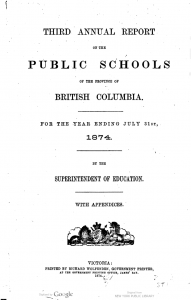“I am grateful to live, learn, work and play on the traditional, ancestral and unceded territory of the Musqueam (xʷməθkʷəy̓əm) and Tsleil – Waututh (səl̓ilw̓ət) people”
I have chosen to examine a set of historical documents related to the history of education in British Columbia, where I currently live, learn, and play. New Westminster became the capital of the British Columbia colony in 1866, a pivotal moment that marked the area’s transition under British colonial influence. I began my research by exploring the historical timeline available on the UBCIC, which provided insight into key events that shaped the educational system in this region, particularly after 1866.
Using the UBC library as my resource with the keywords “British Columbia. Dept. of Education,” I came across several annual school reports dating back to 1874, which serve as primary documents for my investigation into the history of education in BC. Another set of keywords I used was “history of Indigenous education,” which yielded several results, including the paper Literacy in Aboriginal Education by Lynda .

These documents reflect the relationship between education systems and Indigenous communities and provide insights into how Indigenous peoples were represented or marginalized in these educational texts.
I began by reviewing the historical documents, specifically the annual school reports from the late 19th century, and searched for the keywords: Indian; Indigenous; Aboriginal; First Nations; Native; Inuit; Métis; Black; Boarding Schools; and English. I found several mentions of boarding schools and English, but no references to “Indigenous” or “Aboriginal,” or other keywords stated earlier. Literacy was primarily measured in terms of reading and writing in English. Additionally, teacher training during this period was associated with the Board of Education certificates 1, 2, and 3, though there was little information on the criteria for these certifications in relation to Indigenous students. Interestingly, the idea of the excellence of boarding schools was expressed, and an increase in the number of such schools was also recommended.
Another statement that caught my attention was the suggestion of the superintendent Joseph:
“It may be worth of consideration as to whether a parent neglecting or refusing his children to school should not be deprived of his right to vote at elections, and be deemed legally ineligible for any office, however humble.”
Thus, implying that a parent who neglects or refuses to send their children to public school should face serious consequences, such as losing the right to vote in elections and being deemed ineligible to hold any public office, regardless of how minor that office might be.
In his conclusion for the report, Joseph specifies that the public schools of BC will increase their significance and will not only reach every remote settlement but also isolated families within its borders until all children shall obtain at least the rudiments of English education and thus have banished ignorance and illiteracy from among the retarding agencies within the province.
I could not stop here and wanted to learn more about what Lynda had to say about Literacy in Aboriginals. I found that the same concerns were addressed in her observations as well. She discovered the under-representation of Aboriginal literacy and cultural knowledge. Indeed, reading her report revealed similar facts, but it left me with a deeper meaning.
I have always welcomed my students as whole people, with their emotions, thought processes, and learning patterns. But perhaps I was sometimes short of being curious and willing to learn what they bring as part of their cultural and spiritual learning.
These readings have deepened my understanding of what a land acknowledgment truly means as an educator and how I can live by it while delivering the knowledge I have, but at the same time, remain open to the knowledge they bring to class.
REFERENCES:
1. Union of BC Indian Chiefs – UBCIC
2. British Columbia. (n.d.). Annual report of the public schools. Retrieved from
HathiTurst.org
3. Curwen Doige, L.,A. (2001). Literacy in aboriginal education: An historical
perspective. Canadian Journal of Native Education, 25(2), 117-128. Retrieved from
UBC Library